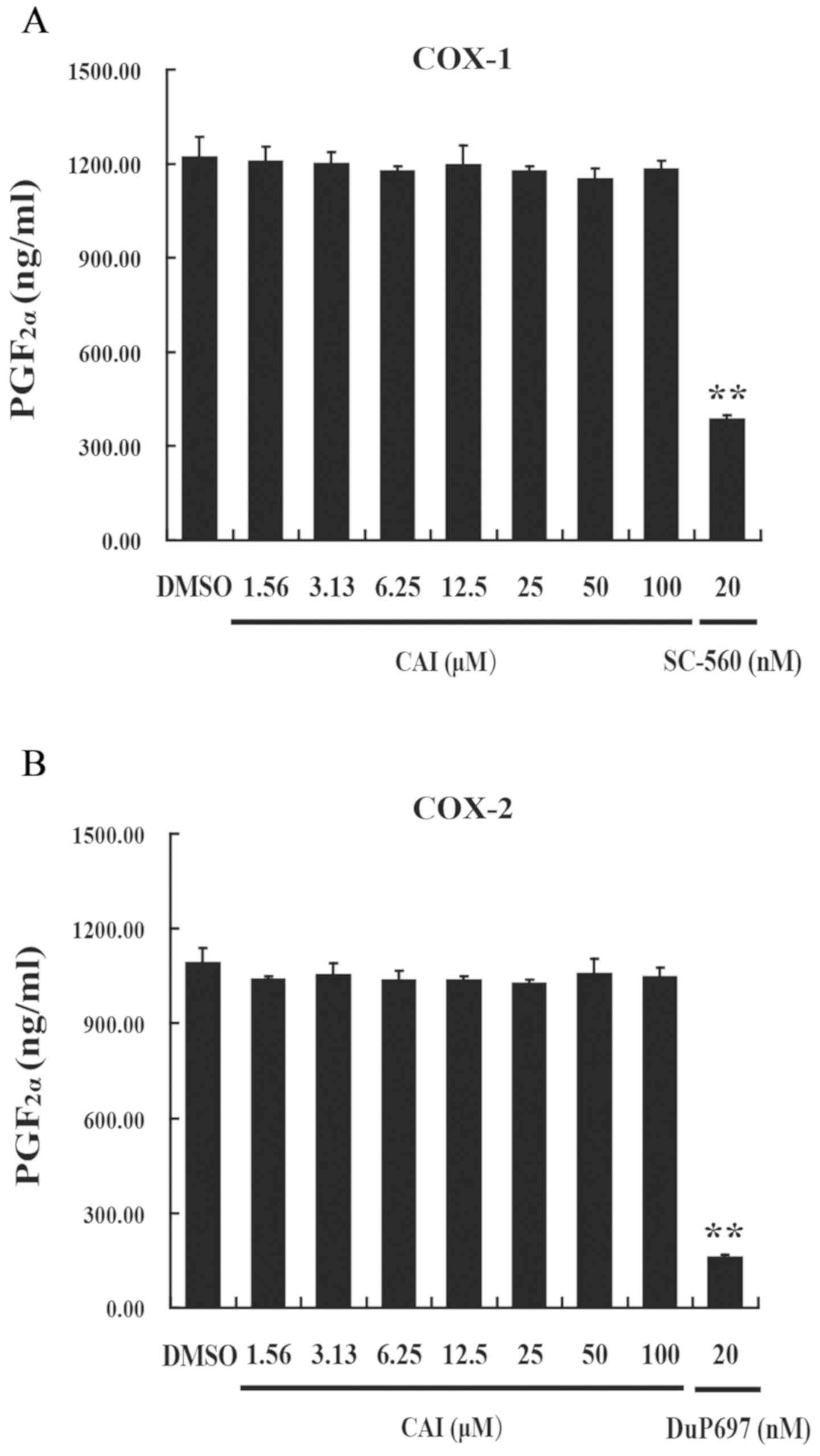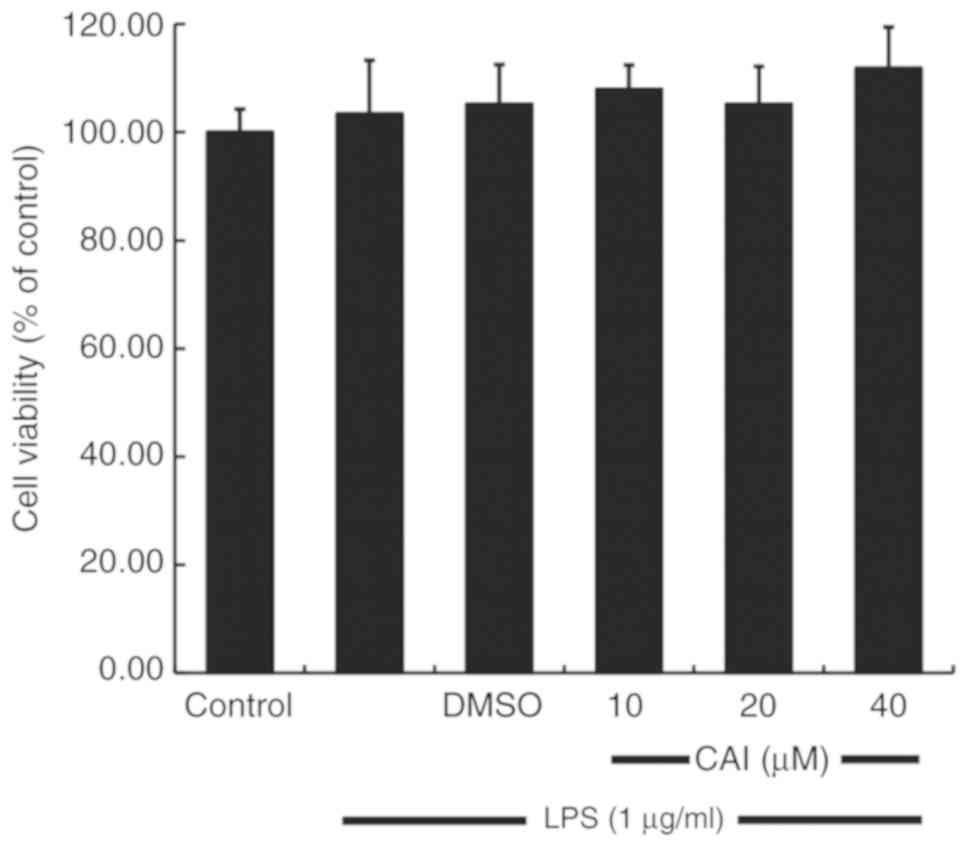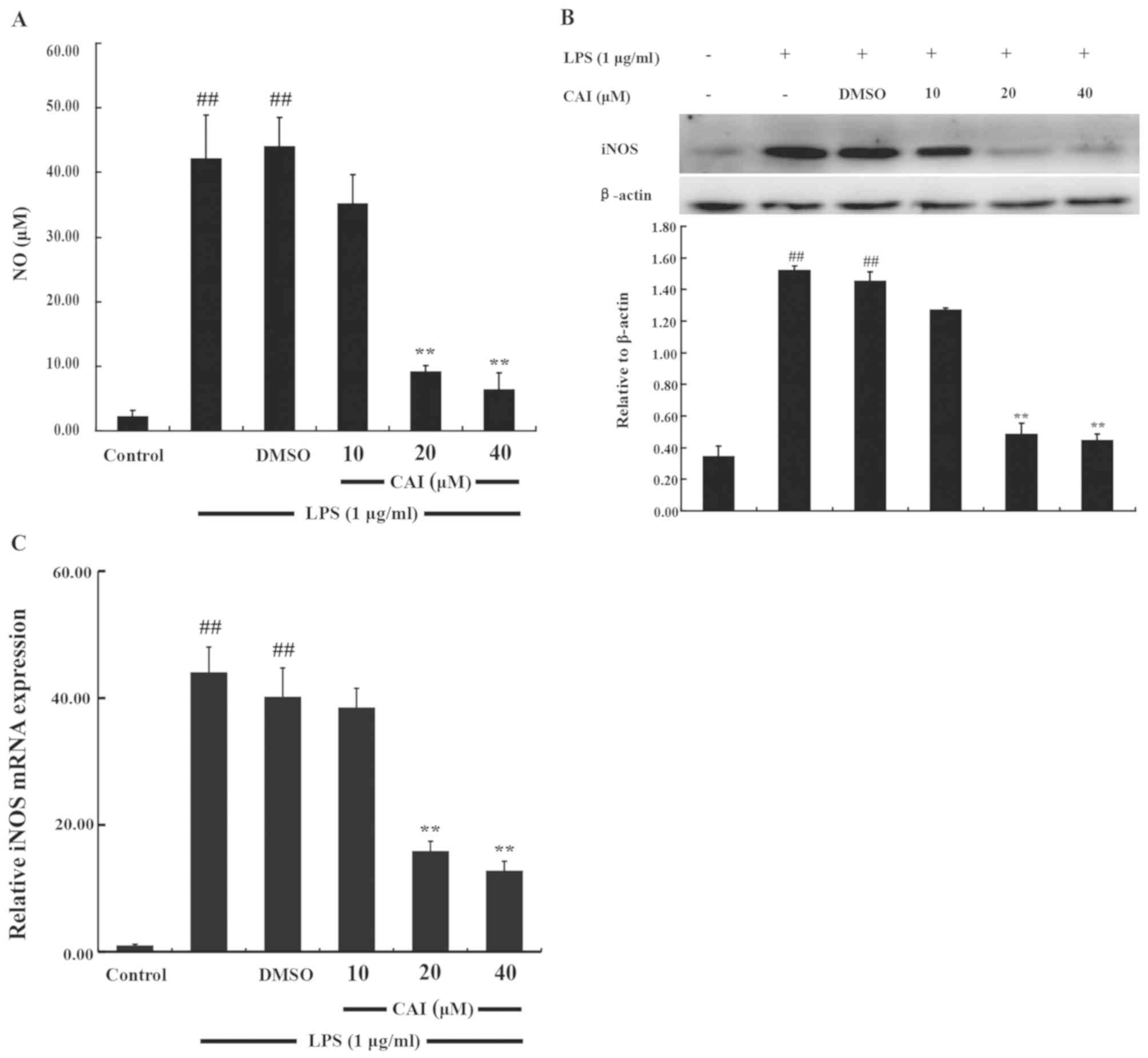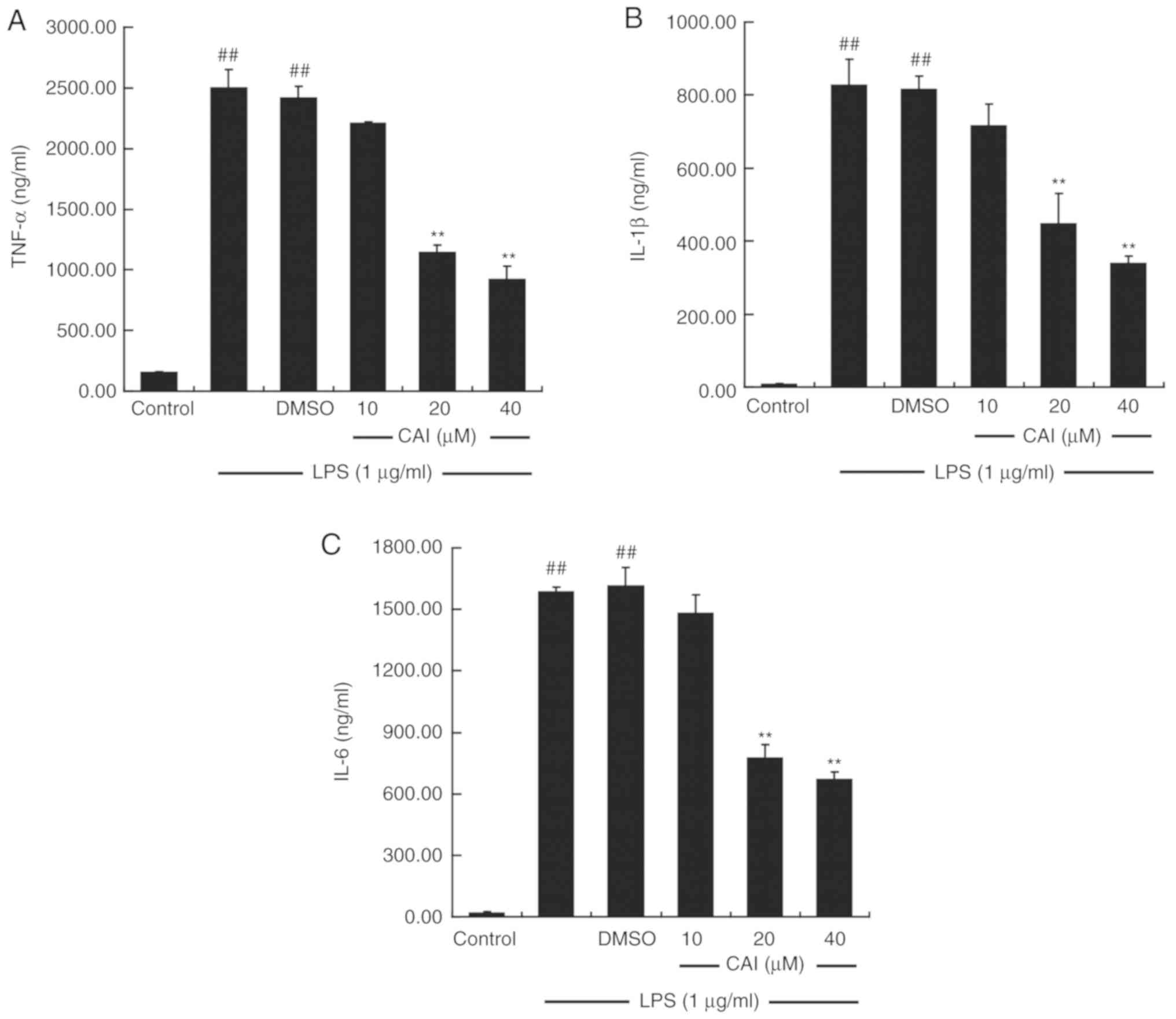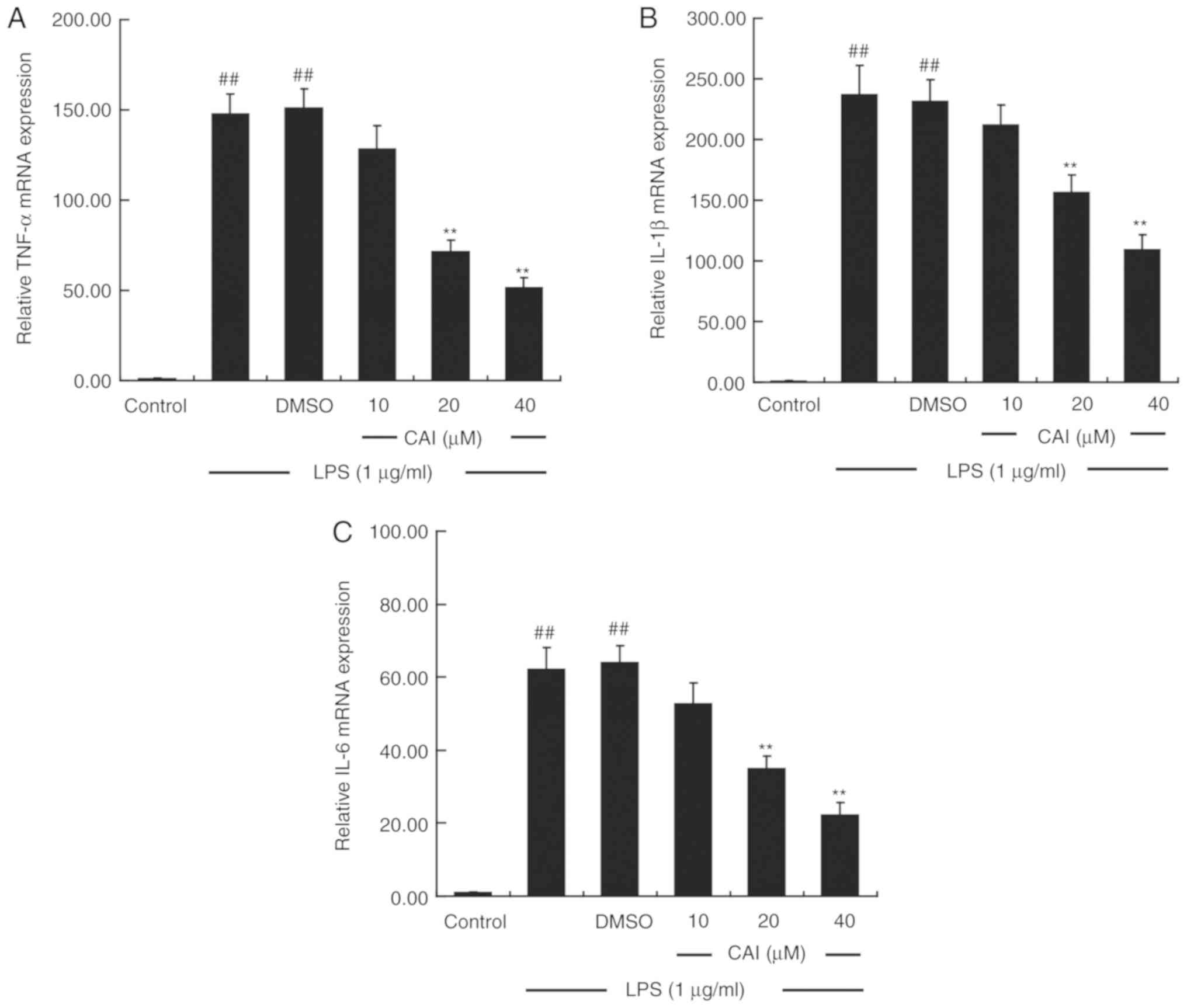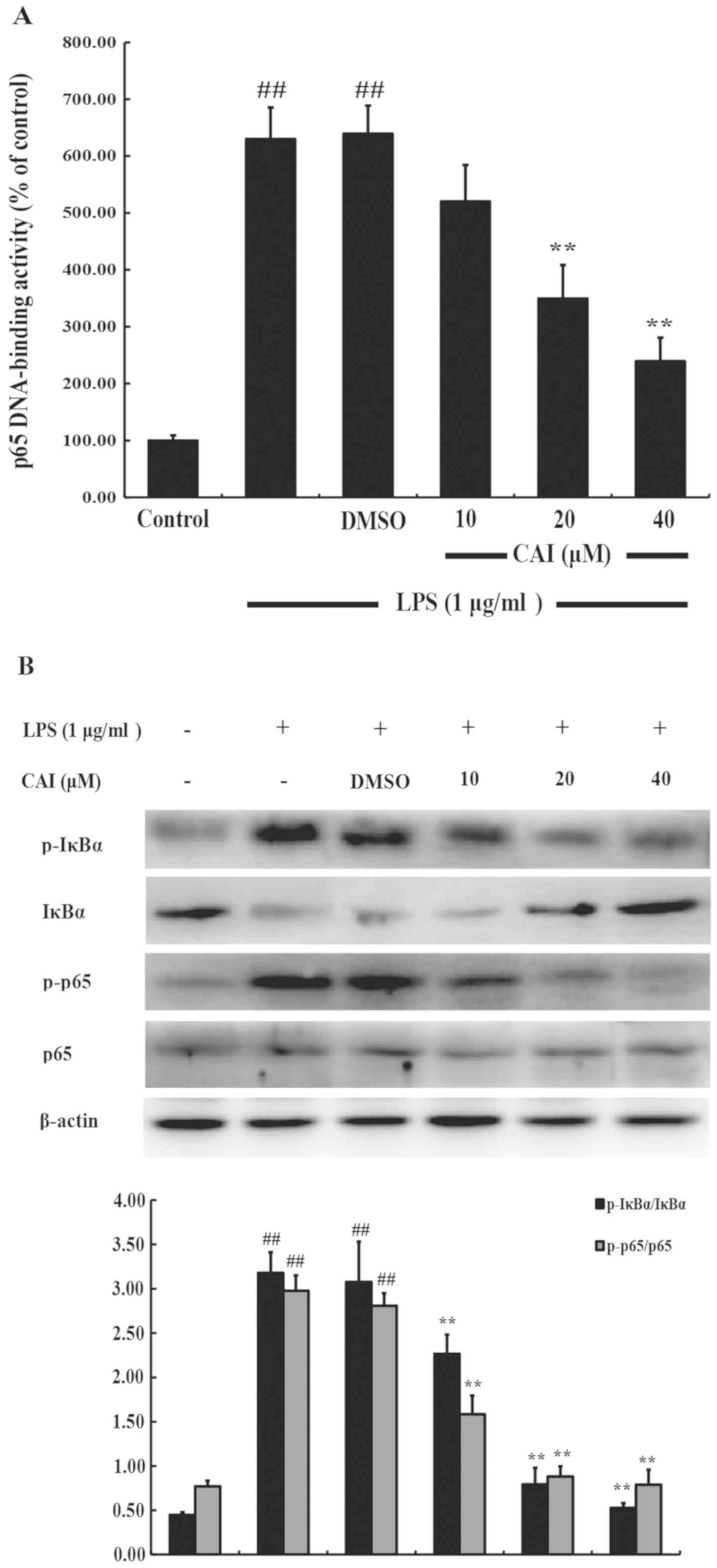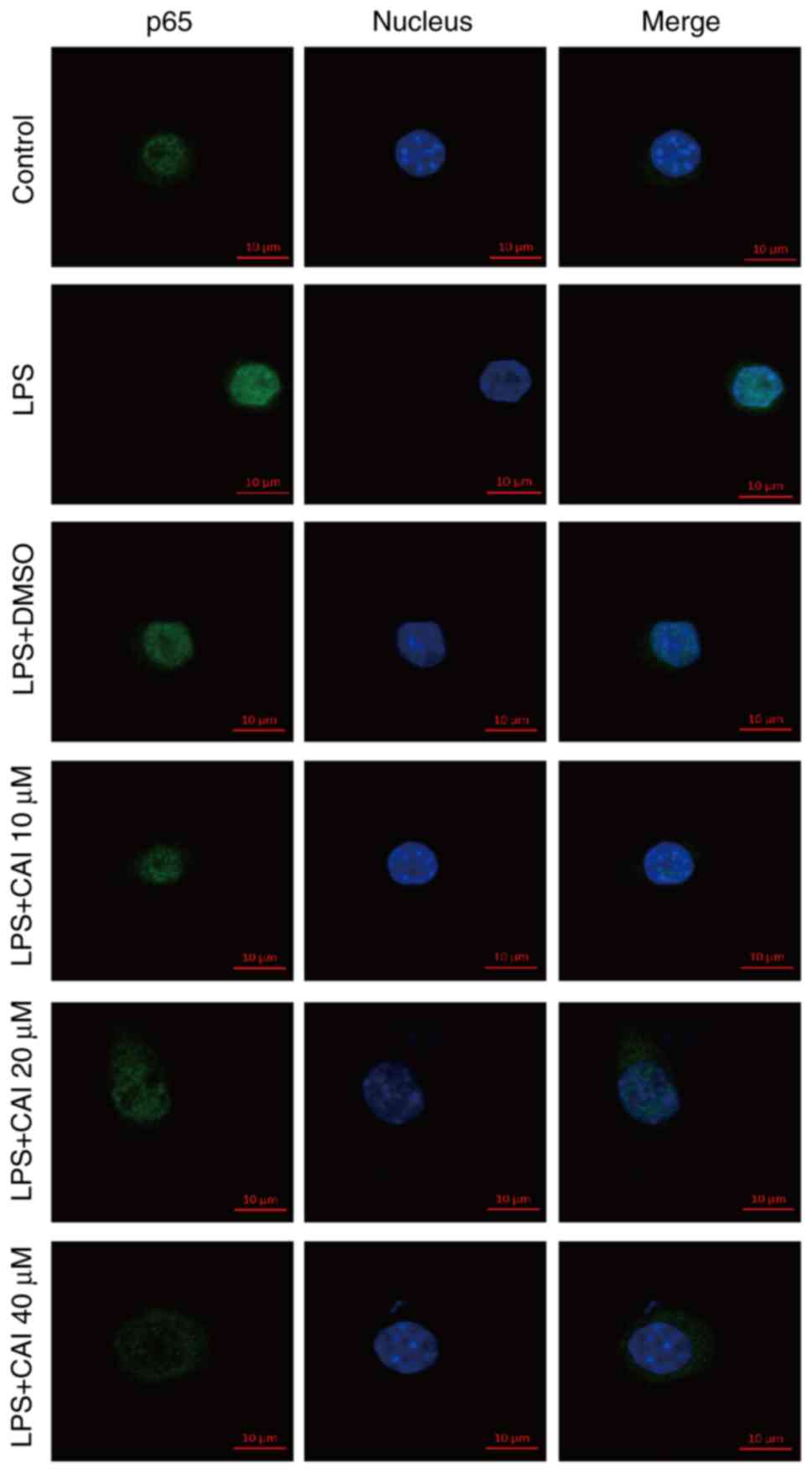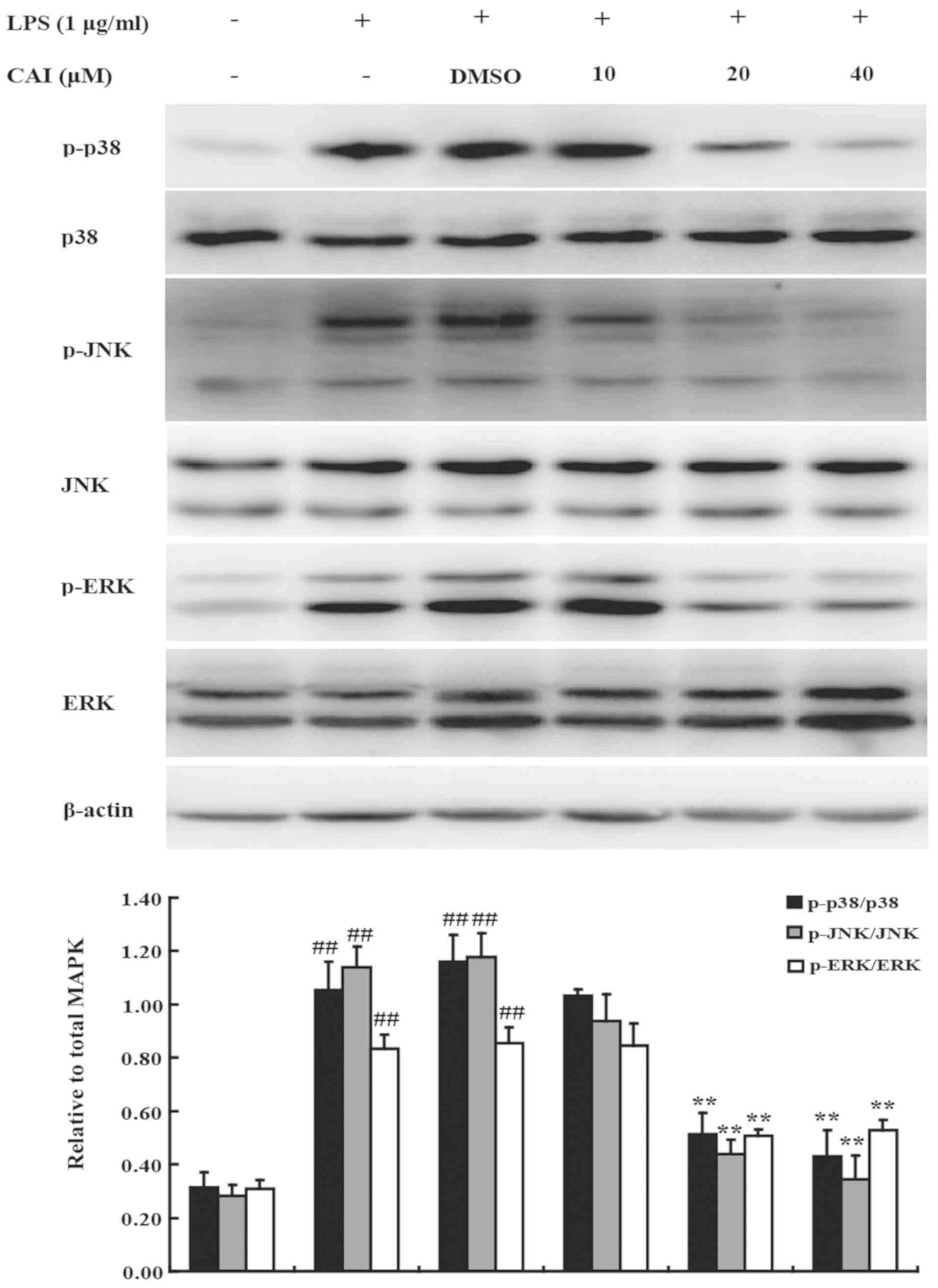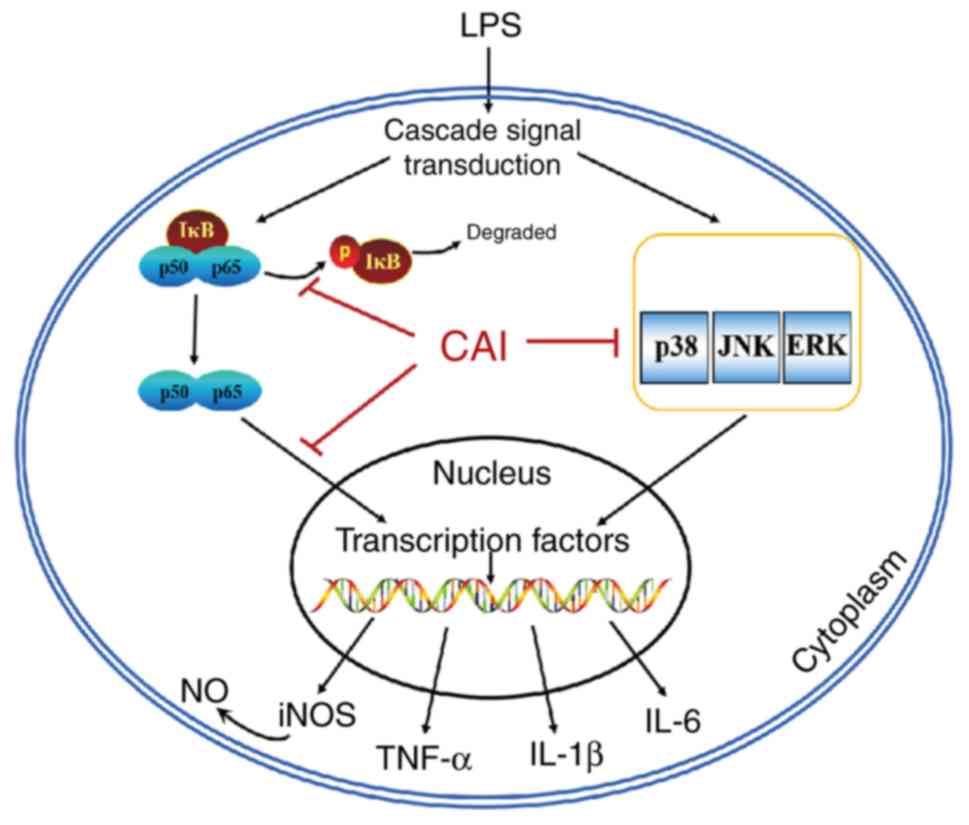|
1
|
Krishnamoorthy S and Honn KV: Inflammation
and disease progression. Cancer Metastasis Rev. 25:481–491.
2006.PubMed/NCBI View Article : Google Scholar
|
|
2
|
Kawai T and Akira S: TLR signaling. Cell
Death Differ. 13:816–825. 2006.PubMed/NCBI View Article : Google Scholar
|
|
3
|
Siebert S, Tsoukas A, Robertson J and
McInnes I: Cytokines as therapeutic targets in rheumatoid arthritis
and other inflammatory diseases. Pharmacol Rev. 67:280–309.
2015.PubMed/NCBI View Article : Google Scholar
|
|
4
|
Jang KJ, Choi SH, Yu GJ, Hong SH, Chung
YH, Kim CH, Yoon HM, Kim GY, Kim BW and Choi YH: Anti-inflammatory
potential of total saponins derived from the roots of panax ginseng
in lipopolysaccharide-activated RAW 264.7 macrophages. Exp Ther
Med. 11:1109–1115. 2016.PubMed/NCBI View Article : Google Scholar
|
|
5
|
Wei X, Song H, Yin L, Rizzo MG, Sidhu R,
Covey DF, Ory DS and Semenkovich CF: Fatty acid synthesis
configures the plasma membrane for inflammation in diabetes.
Nature. 539:294–298. 2016.PubMed/NCBI View Article : Google Scholar
|
|
6
|
Zhu L, Wei W, Zheng YQ and Jia XY: Effects
and mechanisms of total glucosides of paeony on joint damage in rat
collagen-induced arthritis. Inflamm Res. 54:211–220.
2005.PubMed/NCBI View Article : Google Scholar
|
|
7
|
Diakos CI, Charles KA, McMillan DC and
Clarke SJ: Cancer-related inflammation and treatment effectiveness.
Lancet Oncol. 15:e493–e503. 2014.PubMed/NCBI View Article : Google Scholar
|
|
8
|
Ferrucci L and Fabbri E: Inflammageing:
Chronic inflammation in ageing, cardiovascular disease, and
frailty. Nat Rev Cardiol. 15:505–522. 2018.PubMed/NCBI View Article : Google Scholar
|
|
9
|
Kohn EC, Sandeen MA and Liotta LA: In vivo
efficacy of a novel inhibitor of selected signal transduction
pathways including calcium, arachidonate, and inositol phosphates.
Cancer Res. 52:3208–3212. 1992.PubMed/NCBI
|
|
10
|
Kohn EC, Felder CC, Jacobs W, Holmes KA,
Day A, Freer R and Liotta LA: Structure-function analysis of signal
and growth inhibition by carboxyamido-triazole, CAI. Cancer Res.
54:935–942. 1994.PubMed/NCBI
|
|
11
|
Wasilenko WJ, Palad AJ, Somers KD,
Blackmore PF, Kohn EC, Rhim JS, Wright GL Jr and Schellhammer PF:
Effects of the calcium influx inhibitor carboxyamido-triazole on
the proliferation and invasiveness of human prostate tumor cell
lines. Int J Cancer. 68:259–264. 1996.PubMed/NCBI View Article : Google Scholar
|
|
12
|
Moody TW, Chiles J, Moody E, Sieczkiewicz
GJ and Kohn EC: CAI inhibits the growth of small cell lung cancer
cells. Lung Cancer. 39:279–288. 2003.PubMed/NCBI View Article : Google Scholar
|
|
13
|
Hussain MM, Kotz H, Minasian L, Premkumar
A, Sarosy G, Reed E, Zhai S, Steinberg SM, Raggio M, Oliver VK, et
al: Phase II trial of carboxyamidotriazole in patients with
relapsed epithelial ovarian cancer. J Clin Oncol. 21:4356–4363.
2003.PubMed/NCBI View Article : Google Scholar
|
|
14
|
Dutcher JP, Leon L, Manola J, Friedland
DM, Roth B and Wilding G: Eastern Cooperative Oncology Group. Phase
II study of carboxyamidotriazole in patients with advanced renal
cell carcinoma refractory to immunotherapy: E4896, an Eastern
cooperative oncology group study. Cancer. 104:2392–2399.
2005.PubMed/NCBI View Article : Google Scholar
|
|
15
|
Mikkelsen T, Lush R, Grossman SA, Carson
KA, Fisher JD, Alavi JB and Rosenfeld S: Phase II clinical and
pharmacologic study of radiation therapy and carboxyamido-triazole
(CAI) in adults with newly diagnosed glioblastoma multiforme.
Invest New Drugs. 25:259–263. 2007.PubMed/NCBI View Article : Google Scholar
|
|
16
|
Ju R, Wu D, Guo L, Li J, Ye C and Zhang D:
Inhibition of pro-inflammatory cytokines in tumour associated
macrophages is a potential anti-cancer mechanism of
carboxyamidotriazole. Eur J Cancer. 48:1085–1095. 2012.PubMed/NCBI View Article : Google Scholar
|
|
17
|
Guo L, Ye C, Chen W, Ye H, Zheng R, Li J,
Yang H, Yu X and Zhang D: Anti-inflammatory and analgesic potency
of carboxyamidotriazole, a tumorostatic agent. J Pharmacol Exp
Ther. 325:10–16. 2008.PubMed/NCBI View Article : Google Scholar
|
|
18
|
Zhu L, Li J, Guo L, Yu X, Wu D, Luo L, Zhu
L, Chen W, Chen C, Ye C and Zhang D: Activation of NALP1
inflammasomes in rats with adjuvant arthritis; a novel therapeutic
target of carboxyamidotriazole in a model of rheumatoid arthritis.
Br J Pharmacol. 172:3446–3459. 2015.PubMed/NCBI View Article : Google Scholar
|
|
19
|
Zhu L, Li J, Guo L, Yu XL, Wu DW, Chen W,
Chen C, Du XW, Zhang DC and Ye CY: Therapeutic effect of
carboxyamidotriazole on adjuvant arthritis in rats. Zhongguo Yi Xue
Ke Xue Yuan Xue Bao. 38:49–54. 2016.PubMed/NCBI View Article : Google Scholar
|
|
20
|
Du X, Chen W, Wang Y, Chen C, Guo L, Ju R,
Li J, Zhang D, Zhu L and Ye C: Therapeutic efficacy of
carboxyamidotriazole on 2,4,6-trinitrobenzene sulfonic acid-induced
colitis model is associated with the inhibition of NLRP3
inflammasome and NF-κB activation. Int Immunopharmacol. 45:16–25.
2017.PubMed/NCBI View Article : Google Scholar
|
|
21
|
Jeon HL, Yoo JM, Lee BD, Lee SJ, Sohn EJ
and Kim MR: Anti-inflammatory and antioxidant actions of
N-arachidonoyl serotonin in RAW264.7 cells. Pharmacology.
97:195–206. 2016.PubMed/NCBI View Article : Google Scholar
|
|
22
|
Livak KJ and Schmittgen TD: Analysis of
relative gene expression data using real-time quantitative PCR and
the 2(-Delta Delta C(T)) method. Methods. 25:402–408.
2001.PubMed/NCBI View Article : Google Scholar
|
|
23
|
Guo T, Lin Q, Li X, Nie Y, Wang L, Shi L,
Xu W, Hu T, Guo T and Luo F: Octacosanol attenuates inflammation in
both RAW264.7 macrophages and a mouse model of colitis. J Agric
Food Chem. 65:3647–3658. 2017.PubMed/NCBI View Article : Google Scholar
|
|
24
|
Fengyang L, Yunhe F, Bo L, Zhicheng L,
Depeng L, Dejie L, Wen Z, Yongguo C, Naisheng Z, Xichen Z and
Zhengtao Y: Stevioside suppressed inflammatory cytokine secretion
by downregulation of NF-κB and MAPK signaling pathways in
LPS-stimulated RAW264.7 cells. Inflammation. 35:1669–1675.
2012.PubMed/NCBI View Article : Google Scholar
|
|
25
|
Choi WS, Shin PG, Lee JH and Kim GD: The
regulatory effect of veratric acid on NO production in
LPS-stimulated RAW264.7 macrophage cells. Cell Immunol.
280:164–170. 2012.PubMed/NCBI View Article : Google Scholar
|
|
26
|
Choi WS, Seo YB, Shin PG, Kim WY, Lee SY,
Choi YJ and Kim GD: Veratric acid inhibits iNOS expression through
the regulation of PI3K activation and histone acetylation in
LPS-stimulated RAW264.7 cells. Int J Mol Med. 35:202–210.
2015.PubMed/NCBI View Article : Google Scholar
|
|
27
|
Bacchi S, Palumbo P, Sponta A and
Coppolino MF: Clinical pharmacology of non-steroidal
anti-inflammatory drugs: A review. Antiinflamm Antiallergy Agents
Med Chem. 11:52–64. 2012.PubMed/NCBI View Article : Google Scholar
|
|
28
|
Viatour P, Merville MP, Bours V and
Chariot A: Phosphorylation of NF-kappaB and IkappaB proteins:
Implications in cancer and inflammation. Trends Biochem Sci.
30:43–52. 2005.PubMed/NCBI View Article : Google Scholar
|
|
29
|
Seger R and Krebs EG: The MAPK signaling
cascade. FASEB J. 9:726–735. 1995.PubMed/NCBI
|
|
30
|
Nemoto S, DiDonato JA and Lin A:
Coordinate regulation of IkappaB kinases by mitogen-activated
protein kinase kinase kinase 1 and NF-kappaB-inducing kinase. Mol
Cell Biol. 18:7336–7343. 1998.PubMed/NCBI View Article : Google Scholar
|
|
31
|
Seibert K, Zhang Y, Leahy K, Hauser S,
Masferrer J, Perkins W, Lee L and Isakson P: Pharmacological and
biochemical demonstration of the role of cyclooxygenase 2 in
inflammation and pain. Proc Natl Acad Sci USA. 91:12013–12017.
1994.PubMed/NCBI View Article : Google Scholar
|
|
32
|
Zhu L, Duan MY, Zhang XJ, Li J, JU R, Guo
L, Lu S and Ye CY: Inhibitory effects of carboxyamidotriazole on
cytokines production by peritoneal macrophages from adjuvant
arthritis rats. Basic Clin Med. 38:798–802. 2018.
|
|
33
|
Zhang X and Mosser DM: Macrophage
activation by endogenous danger signals. J Pathol. 214:161–178.
2008.PubMed/NCBI View Article : Google Scholar
|
|
34
|
Rim HK, Cho W, Sung SH and Lee KT:
Nodakenin suppresses lipopolysaccharide-induced inflammatory
responses in macrophage cells by inhibiting tumor necrosis factor
receptor-associated factor 6 and nuclear factor-κB pathways and
protects mice from lethal endotoxin shock. J Pharmacol Exp Ther.
342:654–664. 2012.PubMed/NCBI View Article : Google Scholar
|
|
35
|
Bogdan C: Nitric oxide and the immune
response. Nat Immunol. 2:907–916. 2001.PubMed/NCBI View Article : Google Scholar
|
|
36
|
Davis KL, Martin E, Turko IV and Murad F:
Novel effects of nitric oxide. Annu Rev Pharmacol Toxicol.
41:203–236. 2001.PubMed/NCBI View Article : Google Scholar
|
|
37
|
Aktan F: iNOS-mediated nitric oxide
production and its regulation. Life Sci. 75:639–653.
2004.PubMed/NCBI View Article : Google Scholar
|
|
38
|
Farlik M, Reutterer B, Schindler C, Greten
F, Vogl C, Müller M and Decker T: Nonconventional initiation
complex assembly by STAT and NF-kappaB transcription factors
regulates nitric oxide synthase expression. Immunity. 33:25–34.
2010.PubMed/NCBI View Article : Google Scholar
|
|
39
|
Kalliolias GD and Ivashkiv LB: TNF
biology, pathogenic mechanisms and emerging therapeutic strategies.
Nat Rev Rheumatol. 12:49–62. 2016.PubMed/NCBI View Article : Google Scholar
|
|
40
|
Ulevitch RJ and Tobias PS: Recognition of
gram-negative bacteria and endotoxin by the innate immune system.
Curr Opin Immunol. 11:19–22. 1999.PubMed/NCBI View Article : Google Scholar
|
|
41
|
Aderem A and Ulevitch RJ: Toll-like
receptors in the induction of the innate immune response. Nature.
406:782–787. 2000.PubMed/NCBI View Article : Google Scholar
|
|
42
|
Bonizzi G and Karin M: The two NF-kappaB
activation pathways and their role in innate and adaptive immunity.
Trends Immunol. 25:280–288. 2004.PubMed/NCBI View Article : Google Scholar
|
|
43
|
Oeckinghaus A, Hayden MS and Ghosh S:
Crosstalk in NF-κB signaling pathways. Nat Immunol. 12:695–708.
2011.PubMed/NCBI View Article : Google Scholar
|
|
44
|
Li Q and Verma IM: NF-kappaB regulation in
the immune system. Nat Rev Immunol. 2:725–734. 2002.PubMed/NCBI View Article : Google Scholar
|
|
45
|
Shibata W, Maeda S, Hikiba Y, Yanai A,
Ohmae T, Sakamoto K, Nakagawa H, Ogura K and Omata M: Cutting edge:
The IkappaB kinase (IKK) inhibitor, NEMO-binding domain peptide,
blocks inflammatory injury in murine colitis. J Immunol.
179:2681–2685. 2007.PubMed/NCBI View Article : Google Scholar
|
|
46
|
Johnson GL and Lapadat R:
Mitogen-activated protein kinase pathways mediated by ERK, JNK, and
p38 protein kinases. Science. 298:1911–1912. 2002.PubMed/NCBI View Article : Google Scholar
|
|
47
|
Strnisková M, Barancík M and Ravingerová
T: Mitogen-activated protein kinases and their role in regulation
of cellular processes. Gen Physiol Biophys. 21:231–255.
2002.PubMed/NCBI
|
|
48
|
Kristof AS, Marks-Konczalik J and Moss J:
Mitogen-activated protein kinases mediate activator
protein-1-dependent human inducible nitric-oxide synthase promoter
activation. J Biol Chem. 276:8445–8452. 2001.PubMed/NCBI View Article : Google Scholar
|
|
49
|
Tanoue T and Nishida E: Docking
interactions in the mitogen-activated protein kinase cascades.
Pharmacol Ther. 93:193–202. 2002.PubMed/NCBI View Article : Google Scholar
|















